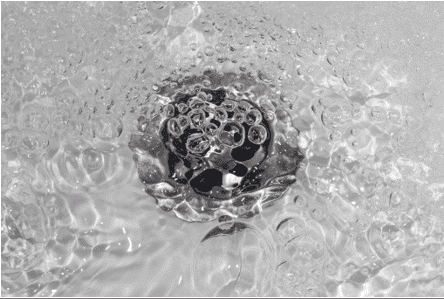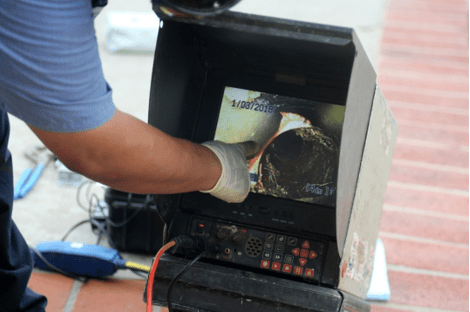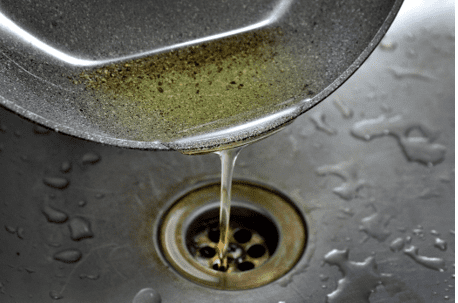
Nobody likes to slosh around in a shower full of dirty water, or stand in a puddle around the floor drain while trying to do laundry.
Slow drains are annoying and messy.
Whether it’s your shower, bathtub, sink, basement floor drain, or a combination of any of these, it’s time to stop ignoring your slow drain and get to the bottom of the problem.
First up: Why do slow drains happen, and why is it happening right now?
The most common explanation is a clog. Everyday use takes a toll on drains over time — soap, hair, grease, food particles, toilet paper… every day, multiple times a day, these items and more get sent down the drains in our homes.
Unless there was a single incident to cause the slowing (such as a toy a diaper, or other item lodged in the drain), it’s likely a clog that built up over time. Soap scum, hair conditioner, and food grease build up in pipes and create a rough, sticky surface that narrows the pipe opening. Then hair and other debris begin to snag on it and eventually create a clog that causes a noticeable slowing or backup in your drains. Gross but true.
What does it mean when my drains are slow?
While a clog is the cause of most drain issues, there could be other reasons, such as:
- A problem with your main sewer line, including intrusive tree roots or leaks.
- Corroded, broken, leaky or aged pipes.
- A lodged object.
- Blocked vent pipes that throw off air pressure balance in your pipes.
- Partially frozen pipes in winter.

How do I know what is causing my slow drains?
Here are some simple trouble-shooting steps to assess your drain issue:
Is only one drain slow?
- If the problem is limited to one drain – especially if that drain is not on the lowest level of your house – a clog is the most likely culprit. It might also be a toy or other item that has fallen into the drain and is blocking flow.
Is the problem widespread?
- If multiple drains are slow, especially drains from different parts of your house, it could signal a problem with the overall plumbing in your house. Or, it might be a more severe issue in the main line that runs from your house to the city sewer pipe under the street in front of your home.
Do you detect gurgling noises or a bad smell in addition to the clog?
- If your drains are making strange noises or regularly are emitting a bad smell like sewage, it could also signal a problem with the main sewer line.
Okay, I think I have it narrowed down. Now what?
Fix for a single slow drain:
- If it’s safe and easy for you to do so, remove the drain cover and do a visual inspection with a flashlight. If there’s nothing obvious in the way (and you aren’t missing any toys or objects that may have gone down the drain!), you can try to clear the clog yourself. The easiest DIY fix is to use a drain snake (which can be purchased online or at a hardware store for relatively cheap). Once the clog has been removed, you can use an enzyme-based drain cleaner to keep your drains flowing.
If you’re still stumped, don’t hesitate to get a trained drain technician out to help. They’ve seen it all and they won’t judge – even if all they need to do is clear out a rubber ducky or clump of hair.
Whatever you do, do not use a harsh liquid drain cleaner product. These types of cleaners often advertise they will dissolve clocks within minutes, but they are highly corrosive and can damage your home’s plumbing system.
Fix for a widespread problem or if you suspect an issue with your main line:
- It’s better to be safe than sorry – if you think there’s a bigger issue than a simple clog, it’s time to call in the professionals. A trained professional can evaluate your pipes, get to the root of the problem, and then recommend a solution. It’s a small investment compared to having pipes burst or having your entire main sewer line back up with sewage. (Yikes.)

How can I prevent slow drains in the future?
Prevention and maintenance are key. Small drain screens installed in your bathtub, shower and bathroom sink drains can help trap hair and debris before they get into your drain. Avoid pouring food grease down your drains – collect the grease in empty jars of food containers and throw it in the garbage. Regular use of an enzyme-based cleaner can help safely remove the gunk build-up in pipes, decreasing the likelihood of clogs.
Looking for a hand?
Trust the highly professional, trained drain technicians and plumbers at Bonfe for everything from routine cleaning to plumbing emergencies and main line issues. We offer many same-day, after-hours and weekend services and can often make repairs in one visit. When in doubt, better call Bonfe.
